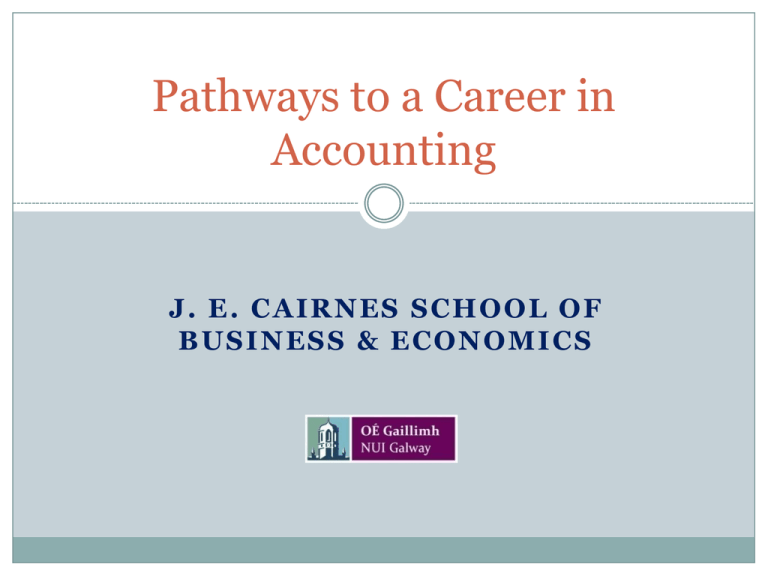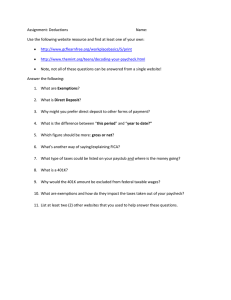Pathways to a Career in Accounting J. E. CAIRNES SCHOOL OF
advertisement

Pathways to a Career in Accounting J . E. C A I R N ES SC HO O L O F B US I N ESS & EC O N O M I C S The Professional Accountant • A Professional Qualification – Why? Regulatory and legal recognition (to conduct statutory audits under the Company Acts)* Professional recognition & support Education & training Ongoing continuing professional development Technical assistance & support Supervision & oversight Representation in matters of professional and national interest and corporate developments The Professional Accountant • With Whom? Main Stream Chartered Accountants Ireland – CAI* Accounting Technicians Ireland - ATI Association of Chartered Certified Accountants – ACCA* Institute of Certified Public Accountants – CPA* Institute of Incorporated Public Accountants – IIPA* • Specialised Chartered Institute of Management Accountants - CIMA Irish Tax Institute – ITI Chartered Institute of Public Finance Accounting - CIPFA Pathways to The Profession Post LC academic level Masters Entry Qualified Accountant Graduate Entry Post LC Entry Accounting Technician (ATI & IIPA) Time taken to qualify 4 to 7 years depending on entry and professional body Note this is a ‘generalised ‘representation and there will be differing detail and variation depending on the professional accounting body whose information web-sites should be consulted for full information The Professional Training Requirement • A requirement for ‘trainees’ whatever the point of entry to the qualification route Professional accountancy firms (i.e. ‘BIG 4’ - KPMG, PWC, Deloittes, Ernst & Young) Industry and other firms • A ‘training contract’ is often entered into usually covering the balance of time left to qualification • More flexibility with some qualifications and nonprofessional accountancy firm employments (i.e. ACCA, CIMA, IIPA and Others) The Professional Examinations • All of the professional bodies require ‘trainees’ to sit and pass a series of professional examinations across many subject areas: • Financial Accounting Management Accounting Auditing & Assurance Finance Taxation Business Law Corporate Governance Etc...... Trainees can be ‘exempted’ from some (never all) of the professional examinations if they have relevant, approved, academic examinations in cognate subject areas. Why the Graduate Route? • For some the non-graduate route is more suitable Immediate employment is desired Economic necessity Uncertainty that the University environment will suit Why the Graduate Route? • For others the graduate route is more suitable / accessible Immediate employment may not be possible A desire to explore differing domains of knowledge in a secure environment – the university experience An academic qualification provides a safety net May want to defer a final career decision & take a general business degree Course choice is important Non-core business degrees are actively pursued by some employers – Engineering, Science, Law Due to employer expectations there are greater opportunities for ‘graduates’ in the job market Degree Choice & Professional Examination Exemptions Course Undertaken Exemptions from Professional Exams Subject Choices & Results Degree Choice & Professional Examination Exemptions J. E. Cairnes School of Business & Economics NUIG • B. Comm - GY201 - Accounting - Economics - Management of Human Resources - Business Information Systems - Marketing • Gives students a strong broad spectrum business degree • Specialisation is not required until final year – students can wait before deciding on career direction • Accounting specialisation affords students maximum exemptions from the examinations of the professional accountancy bodies equal to or exceeding all other Irish University general business degrees * * Handout Available Degree Choice & Professional Examination Exemptions J. E. Cairnes School of Business & Economics NUIG • B. Comm (Accounting) – GY207 - Specialist Accounting Degree • Gives students a strong accounting business degree with full immersion in accounting and accounting related subjects from day one • Suitable for students who have decided that they wish to pursue a career in accounting • Smaller class size – more intimate – greater visibility & attention • For all professional accountancy bodies equals or exceeds the exemptions that are available from general or specialised degrees in all of the other Irish universities* * Handout Available Degree Choice & Professional Examination Exemptions J. E. Cairnes School of Business & Economics NUIG • B. Comm (International) – GY202/3/4 • – General business degree with a language • Gives students a strong broad spectrum business degree – language is a core element • Students can still pursue a career in accounting, however, they will have less exemptions from the examinations of the professional accountancy bodies Exemption Comparison At a Glance University Courses ACCA Based on course in the university affording the greatest exemptions (handout available) Exemption Comparison At a Glance University Courses CIMA Based on course in the university affording the greatest exemptions (handout available) Exemption Comparison At a Glance University Courses CAI Based on course in the university affording the greatest exemptions (handout available) Exemptions - ITs All of the Institutes of Technology have business accounting courses that will gain significant exemptions form the professional examinations (See Handout) With the exception of the BA – Accounting at Carlow Institute of Technology, the B. Comm (Accounting) at the J. E. Cairnes School of Business & Economics will provide students with greater exemptions from the examinations of the professional accountancy bodies. Masters of Accounting • After completing a degree specialising in accounting students may opt to complete a one year Masters. • There are many Masters of Accounting programmes available from third level Institutions with comparable exemptions from the examinations of the professional accountancy bodies. Usually gives exemption from all bar the final level of examinations of the professional accountancy bodies For some bodies (i.e. CAI) students will still have to complete a training contract (3 years) Where do our Graduates Go? 2013 Graduates (Stats based on valid responses to survey) • B. Comm (Accounting) – GY207 40% - Training Contract with Accounting Firm 57% - Into a Masters of Accounting (Majority – NUIG) • 95% - Training Contract/Employment from our Masters Programme 3% - Other B. Comm – Accounting Specialisation – GY201 46% - Training Contract with Accounting Firm 50% - Further Study/Training (significant numbers in Masters Programmes) 4% - Other Careers Professional Accountancy & Consulting Careers Industry & Commerce Non- Profit Sector Public Service Education
